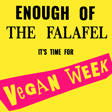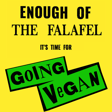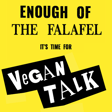
157- RSPCA wants to ban cat cafes in the UK
In the UK this week, the RSPCA and Cats Protection UK have publicly spoken out against cat cafes; the businesses where customers can pay for the privilege of sipping lattes alongside (generally) rescued cats. But how are Dominic, Julie & Ant feline about this, and the rest of the week's animal rights news?!
****************
Enough of the Falafel is a community of people who love keeping on top of the latest news in the world of veganism & animal rights. With the Vegan Week podcast, we aim to keep listeners (& ourselves) informed & up-to-date with the latest developments that affect vegans & non-human animals; giving insight, whilst staying balanced; remaining true to our vegan ethics, whilst constantly seeking to grow & develop.
Each week we look through news stories from the past 7 days in the world of veganism & animal rights.
If you spot any news stories that might catch our fancy, or have an idea for a discussion topic, get in touch via enoughofthefalafel@gmail.com.
******************
This week's stories:
https://plantbasednews.org/culture/sport/olympians-open-letter-plant-based-olympics/
https://www.freedomforanimals.org.uk/news/lancaster-bid-reindeer-win
https://eastangliabylines.co.uk/farming/revealed-norfolk-farms-breach-eco-rules-twice-a-week/#:~:text=Norfolk's%20factory%20farms%20break%20environmental,Will%20looser%20regulations%20worsen%20pollution%3F&text=New%20figures%20have%20revealed%20that,environmental%20rules%20twice%20a%20week.
https://www.fwi.co.uk/livestock/what-makes-a-sustainable-dairy-farm-survey-results
https://news.sky.com/story/cat-cafes-should-be-phased-out-rspca-warns-13331963
https://www.independent.co.uk/life-style/savage-cat-food-recall-bird-flu-b2716999.html
https://www.theguardian.com/world/2025/mar/18/mexico-city-bloodless-bullfights
https://www.bbc.co.uk/news/articles/czrn4p2k30xo
****************
Thanks everyone for listening; give us a rating and drop us a message to say "hi"; it'll make our day!
Dominic, Julie & Ant


